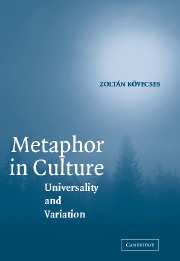Book contents
- Frontmatter
- Contents
- Preface and Acknowledgments
- Metaphor in Culture
- 1 Introduction: Metaphor and the Issue of Universality
- PART I UNIVERSAL METAPHORS
- PART II DIMENSIONS OF METAPHOR VARIATION
- PART III ASPECTS OF METAPHOR INVOLVED IN VARIATION
- PART IV CAUSES OF METAPHOR VARIATION
- 10 Causes of Variation in Metaphor
- 11 Creativity: Metaphor and Blending
- 12 Culture, Coherence, Conflict
- References
- Index
10 - Causes of Variation in Metaphor
Published online by Cambridge University Press: 05 June 2012
- Frontmatter
- Contents
- Preface and Acknowledgments
- Metaphor in Culture
- 1 Introduction: Metaphor and the Issue of Universality
- PART I UNIVERSAL METAPHORS
- PART II DIMENSIONS OF METAPHOR VARIATION
- PART III ASPECTS OF METAPHOR INVOLVED IN VARIATION
- PART IV CAUSES OF METAPHOR VARIATION
- 10 Causes of Variation in Metaphor
- 11 Creativity: Metaphor and Blending
- 12 Culture, Coherence, Conflict
- References
- Index
Summary
What causes our metaphors to vary along the dimensions and in the aspects that were discussed in the previous chapters? I suggest that the causes can be grouped into two large classes: differential experience and differential cognitive preferences or styles. In other words, the suggestion is that, on the one hand, many of our metaphors vary because our experiences as human beings also vary. And, on the other hand, our metaphors vary because the cognitive preferences and styles we put to use for the creation of abstract thought also vary. First, I examine some of the factors or causes that produce differential experience, and then I look at some of the cognitive processes that people employ differentially when they speak and think figuratively.
Two important caveats must be mentioned in connection with these claims. One is that the lists of factors and cognitive processes that produce variation in metaphor are not meant to be exhaustive. There is no doubt that both lists could and should be expanded for a more complete account of the potential causes of metaphor variation. The other caveat is that the factors that I take to produce differential experience (and hence different metaphors) and the differential cognitive processes that produce different metaphors are not separable from each other but work jointly. That is, differential experience is produced by means of cognitive processes, and differential cognitive processes that produce different metaphors always operate on some experiential content. I lay out the two large classes of factors or causes separately only for the sake of a clearer presentation.
- Type
- Chapter
- Information
- Metaphor in CultureUniversality and Variation, pp. 231 - 258Publisher: Cambridge University PressPrint publication year: 2005
- 1
- Cited by



